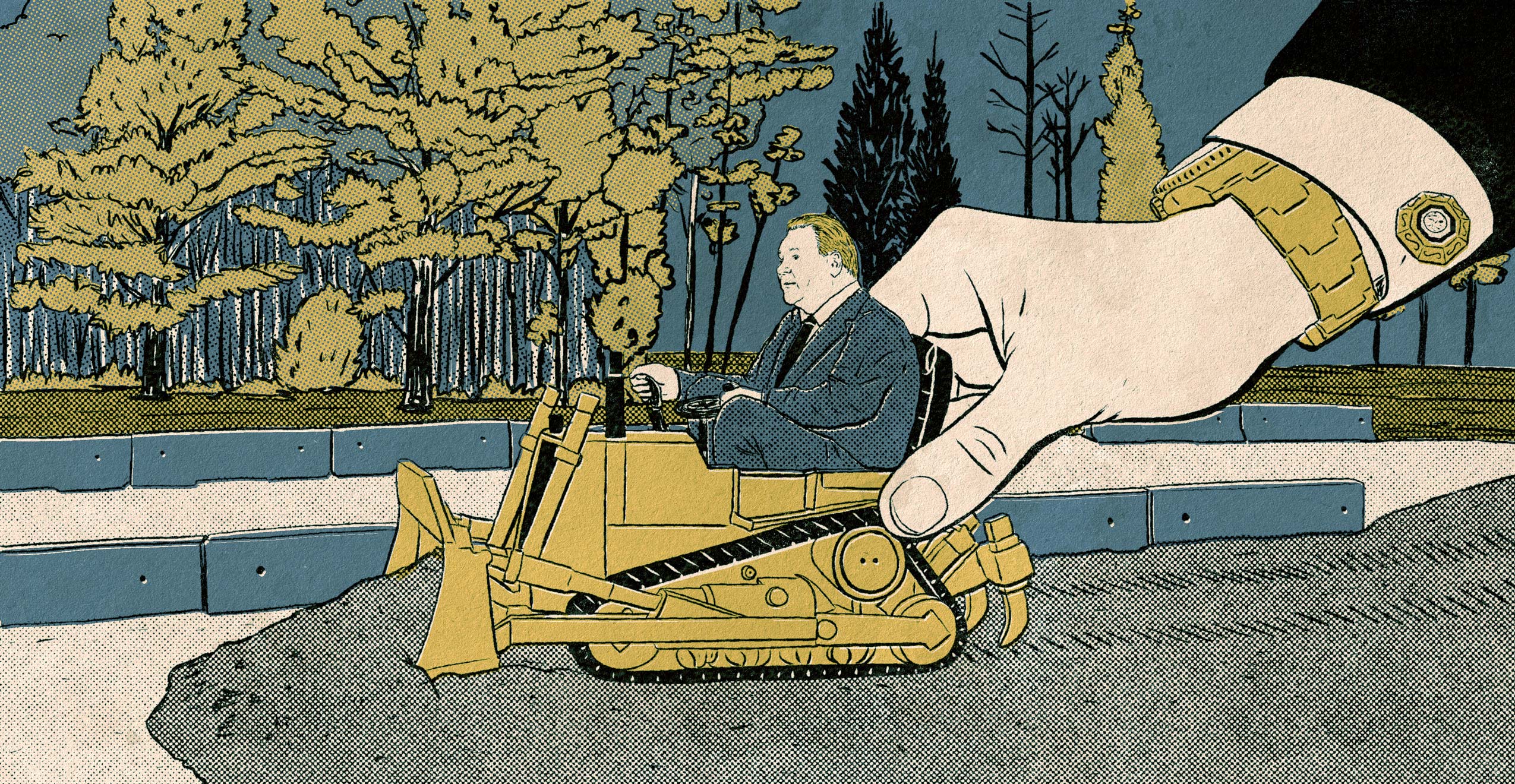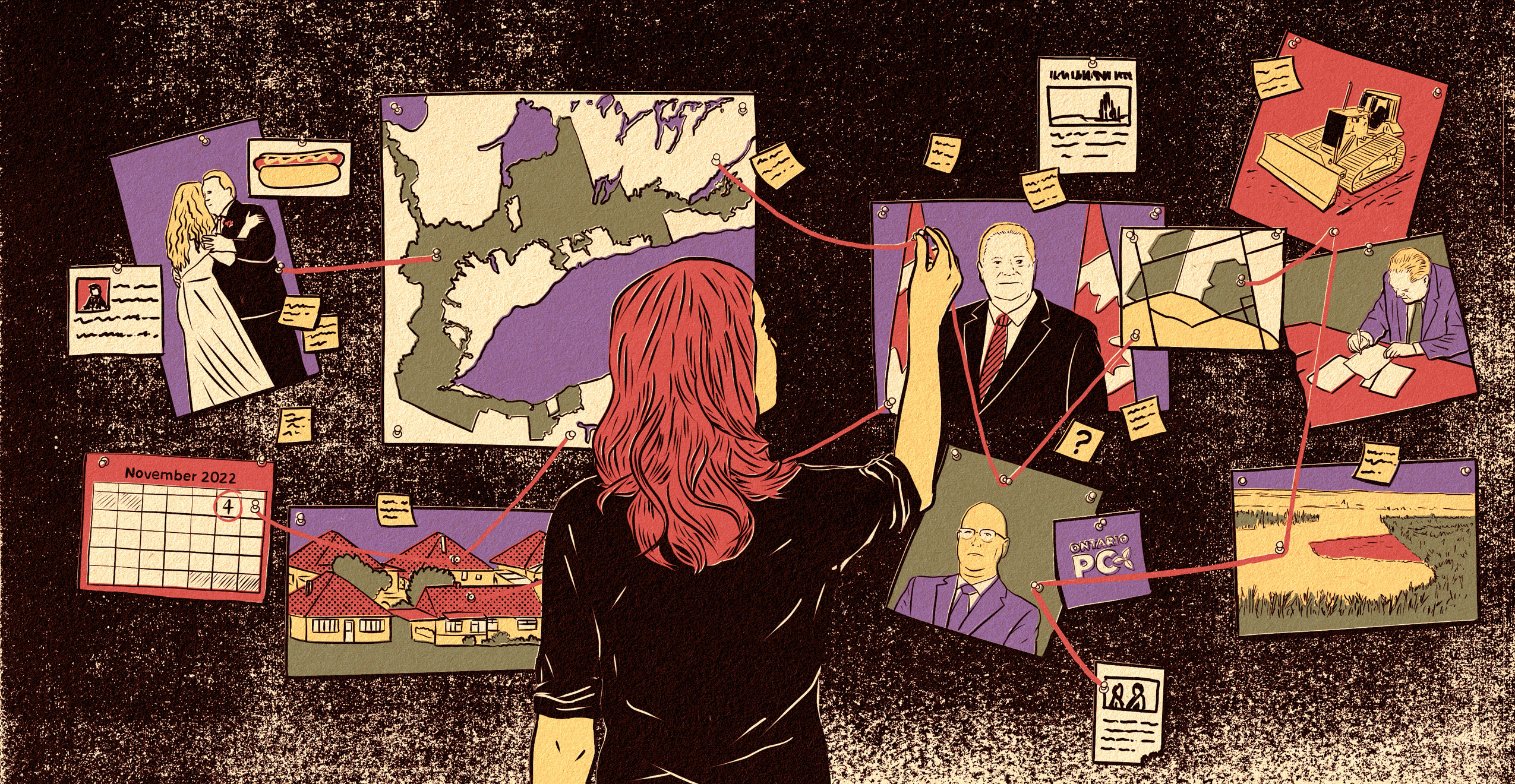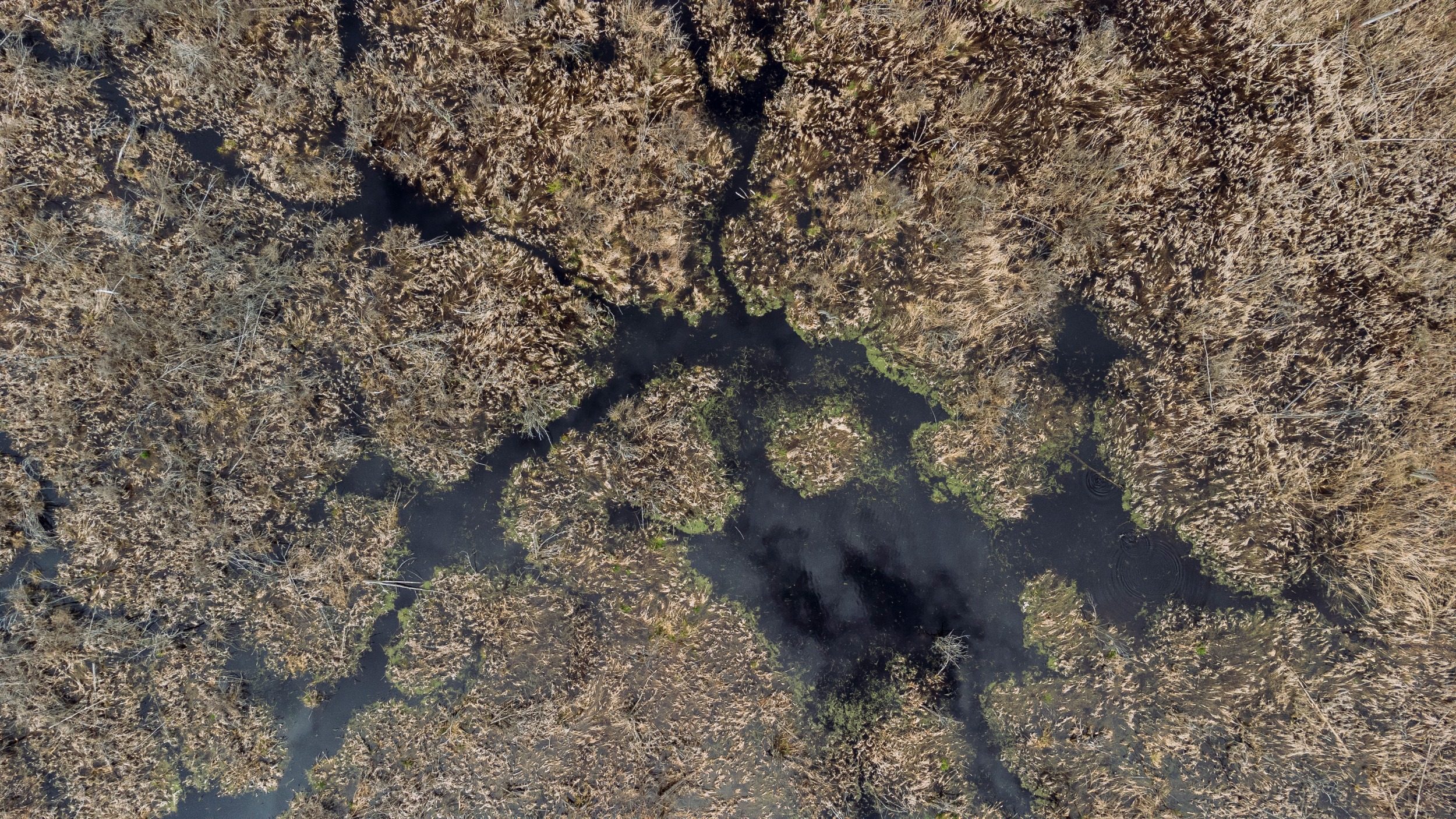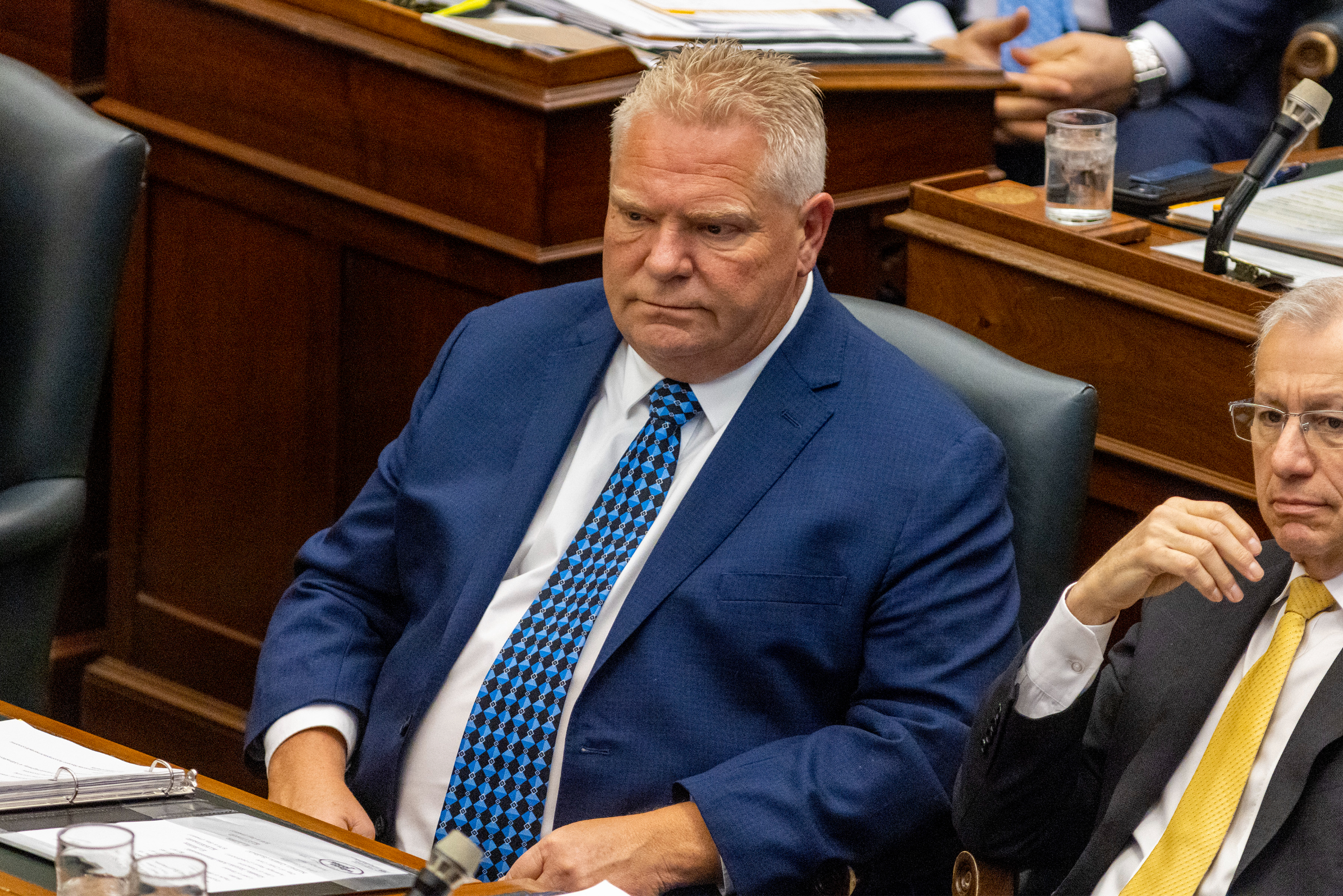
Celebrating 7 years of The Narwhal — and gearing up for the next 7
Between a fresh take on engagement and our new life on video, our team is...
Caving under the pressure of a mounting political crisis, Ontario Premier Doug Ford has reversed the decision to open the Greenbelt.
Speaking at a podium outside of a caucus retreat in Niagara Falls, a subdued Ford apologized on Sept. 21 and promised to return all land to the Greenbelt and not touch the protected area again.
“I made a promise to you that I wouldn’t touch the Greenbelt. I broke that promise. And for that I am very, very sorry,” Ford said with his caucus standing behind him — many of them the same ministers who voted to approve the plan last year.
“It was a wrong decision,” Ford added. “We’re putting this land back in the Greenbelt.”
The apology comes almost 11 months after the Ford government announced plans to open 3,000 hectares (7,400 acres) of the protected land for development, reversing years of promises. It also lands in the wake of the resignations of two ministers and two senior Progressive Conservative staffers.
The opening of the Greenbelt would have come at great environmental costs, likely resulting in the loss of 400 hectares of wetlands and woodlands, threatening at least 29 species at risk. It would have also led to the loss of huge swathes of prime agricultural land.
Ford said the decision to restore protections came after ministers delivered feedback from people across the province over a two-day Progressive Conservative retreat.
“It was a mistake to open the Greenbelt,” Ford said. “It was a mistake to open a process that moved too fast and left too much room for some people to benefit over others. It caused people to question our motives.”
“As a first step to earn back your trust, I’ll be reversing the changes we made and won’t make any changes to the Greenbelt in the future,” he added.
The process of choosing exactly what parts of the area would lose protections was marked by chaos and secrecy, successive reports by Ontario’s auditor general and integrity commissioner found. The watchdogs found that a single political staffer named Ryan Amato led the Greenbelt changes, giving preferential treatment to a small group of well-connected developers and asking public servants to work under non-disclosure agreements. They rewrote their recommendations to cabinet in a matter of weeks, based on packages passed from developers to Amato, including one that was handed over at a development industry gala.

Amato, who has said the reports depicted him unfairly, resigned last month. He was soon followed by his boss Steve Clark, who was the minister of municipal affairs and housing and responsible for taking the Greenbelt changes before cabinet.
Two more people stepped down in the last 24 hours: Kaleed Rasheed, minister of public and business service delivery, who gave the integrity commissioner incorrect information about a Las Vegas trip with a Greenbelt developer, and Ford’s director of housing policy, Jae Truesdell, who also went on the trip.
“I expect everyone to follow the rules,” Ford said. “There’s rules that are made for a reason. Follow the rules. It’s as simple as that.”
The Greenbelt scandal began simmering last November after an investigation by The Narwhal and the Toronto Star found the changes would benefit a select group of developers, many of whom had donated large sums to the Progressive Conservatives or hired lobbyists connected to the party.
Soon after the investigation came out, widespread fallout began across the province, including public protests with the rallying cry “hands off the Greenbelt.” Farmers reminded the government that the loss of agricultural land was an irreversible decision. Environmental groups, opposition politicians and residents contacted investigative bodies including the auditor general and the Ontario Provincial Police in droves — and were heard.
In the spring, federal Environment Minister Steven Guilbeault launched a study of how development on former Greenbelt lands could affect the environment, citing requests he’d received from “hundreds of Canadians.” He also said he wouldn’t rule out using other federal powers to halt or slow construction on the sites, depending on the outcome of the study. Of particular concern was the Ontario government’s removal of protections, now reversed, from Duffins Rouge Agricultural Preserve, which sits next to Rouge National Urban Park east of Toronto.
“If there was a large commercial industrial project that was announced on the edge of Banff National Park or Jasper National Park, I think that most Canadians would be outraged from coast to coast to coast,” he said.

And still, the Ontario government doubled down, insisting its decision was necessary to address the housing crisis while shrouding it in secrecy. Though Ford said he didn’t know about the plan to open the Greenbelt until days before it was made public, The Narwhal reported that documents showed the premier’s office had been discussing changes to the Greenbelt months earlier.
Many of those documents, obtained through freedom of information legislation, were heavily redacted, making it impossible to tell exactly who was discussing what about the Greenbelt and when. But the full documents — as well as interviews with many relevant parties — were made available to outgoing auditor general Bonnie Lysyk, who released her findings on Aug. 9.
Weeks before her term ended, Lysyk reported that her eight-month long audit of the decision uncovered a “seriously flawed” and “rushed” process that ignored evidence and “was dismissive of effective land-use planning.” She found that 92 per cent of the lands opened were parcels directly pointed out to Amato by two prominent developers — Michael Rice and Silvio De Gasperis.
“Direct access to the housing minister’s chief of staff resulted in certain prominent developers receiving preferential treatment,” Lysyk wrote in the audit. And in its hurry to grant developers’ dreams, Lysyk found, the government did not adequately consult the public, affected municipalities or First Nations.
Lysyk echoed what the government’s own housing affordability task force found last year: Ontario didn’t need to open the Greenbelt because it already had enough developable land available to meet its housing needs. She made 15 recommendations, including setting better guidelines for engagement between political staff, public servants and stakeholders. The government accepted all but one, refusing Lysyk’s suggestion to “reevaluate” the entire Greenbelt decision, despite admitting the process was flawed. Upon announcing the reversal on Sept. 21, Ford said “now, we’re taking the last recommendation from the auditor general’s report.”

Amato resigned on Aug. 22, two weeks after Lysyk’s report. In his resignation letter obtained by the Globe and Mail, Amato said he has been “unfairly depicted” in recent public statements.
The next day, the RCMP said it had begun an “assessment” of the Greenbelt changes to “determine whether to launch an investigation,” after the Ontario Provincial Police — which had been looking into the changes since January — handed the issue over to avoid any “potential perceived conflict of interest.”
On Aug. 30, J. David Wake, Ontario’s integrity commissioner, released his long-awaited report, which also confirmed how developers had direct access to political staff. Wake found Amato was the ringleader of a “chaotic and almost reckless process” that led to “the creation of an opportunity to further the private interests of some developers improperly.” Wake also reprimanded Clark for failing to ensure everything was done properly: “I find that his lack of awareness was also an aggravating element since he should have provided greater supervision and control over this significant undertaking entrusted to his ministry.”
Clark resigned a week after Wake’s report, on Labour Day.
“Although my initial thought was that I could stay in this role and establish a proper process so that these mistakes don’t happen again, I realize that my presence will only cause a further distraction from the important work that needs to be done and that I need to take accountability for what has transpired,” his resignation letter said.

Speaking to reporters in Niagara, Ford did not offer details on how the process of returning the land to the Greenbelt will work, nor did he offer a timeline.
Asked whether he was worried he might face lawsuits from developers that own the land to be returned to the Greenbelt — some of whom spent $173 million over the summer to buy up even more, an investigation by The Narwhal/Star found — Ford did not directly answer.
“I can’t predict the future,” he said.
“My main goal is to work with the builders because they’re part of this solution. The community builders, as I call them, because they’re the ones building the communities.”
It’s also unclear how the decision to cancel the Greenbelt changes might affect the RCMP review or the federal study.
As for where and when Ontarians might get more housing, things remain uncertain. Ford said housing targets for all municipalities remain the same, not acknowledging cities’ and towns’ concerns about their lack of input.

And, once again, Ford pinned the need for these high targets on the increasing number of immigrants, international students, migrant workers and visitors coming to Ontario. “More people are coming, not to mention the asylum seekers that the federal government is basically dropped on our lap to take care of housing,” Ford said, continuing to oversimplify the complex factors behind the housing crisis and leave out that he explicitly asked the federal government to send more newcomers to the province.
Despite Ford’s Greenbelt flip-flop, the Ontario government is moving ahead with other controversial policies that may harm conservation and climate change goals. These include sweeping changes via Bill 23, which weakened a series of environmental protections for wetlands and the power of conservation authorities.
When asked what consequences he thought he should face for the scandal, the premier demurred, saying he’s the first to admit he’s not perfect.
“Next election, you’ll have the chance to decide if I’ve kept my promises,” Ford said. “If I got it done.”
Get the inside scoop on The Narwhal’s environment and climate reporting by signing up for our free newsletter. On a warm September evening nearly 15...
Continue reading
Between a fresh take on engagement and our new life on video, our team is...

The public has a few days left to comment on Doug Ford’s omnibus development bill....

115 billion litres, 70 years to fix, $5.5 billion in lawsuits
